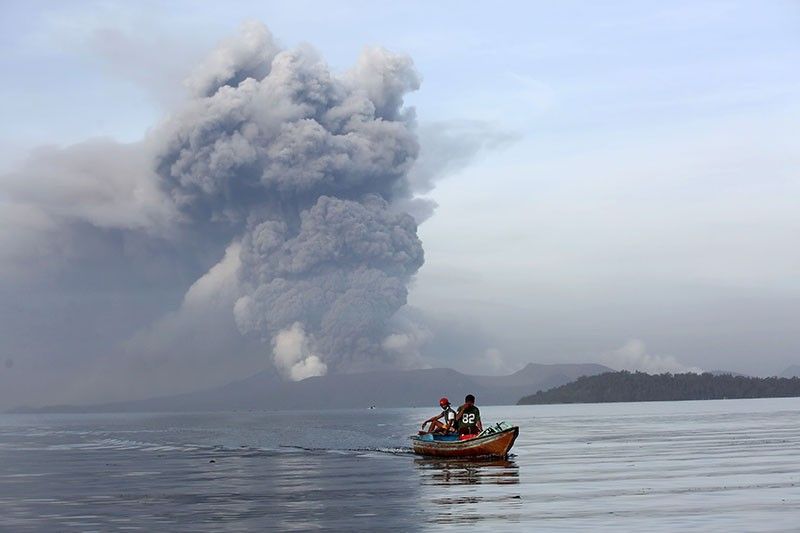January 13, 2020 | 3:51pm
MANILA, Philippines — If worse comes to worst, the eruption of Taal Volcano may last for months or even years, according to the Philippine Institute of Volcanology and Seismology (Phivolcs).
In an interview with radio dzMM, Phivolcs volcanic monitoring division chief Ma. Antonia Bornas said the volcano in Batangas province could erupt several times over a span of months or years after spewing ash that covered parts of Luzon.
According to Bornas, this is the typical behavior of Taal Volcano and Phivolcs is preparing for a worst-case scenario that its eruption may last up to seven months like it did in 1754.
"Maaari po tayong abutin ng ilang buwan o ilang taon, hindi po natin masabi sa ngayon (It may last for several months or years, we cannot tell for now)," Bornas told dzMM Monday.
Bornas also noted that while the volcano's eruption in 1911 only lasted days, it killed some 1,300 people.
According to the Phivolcs website, Taal Volcano has four types of eruption: phreatic (steam-driven), phreatomagmatic (magma and water), strombolian (relatively mild blasts) and plinian (large explosive events that form dark columns of tephra or rock fragment and gas).
Phivolcs has recorded a total of 33 historical eruptions from Taal. The shorter three-day explosion in 1911 was phreatic in nature while the strongest one in 1754 was plinian.
1754 eruption
In a Philippine Studies journal article titled "Sunken Ruins in Lake Taal: An Investigation of a Legend", Thomas Hargrove and Isagani Medina described the 1754 eruption as the "eruption that finally destroyed the Lake Taal towns."
At the time that the eruption started on May 14, 1754, the town of Taal had 8,000 residents while Lipa had about 3,000 and Tanauan about 1,500. Phivolcs data indicate that 12 casualties were recorded in this eruption.
"The volcano constantly belched fire and smoke columns and spewed such quantities of lava 'that only the waters of the lake saved the people on shore from being burnt,' wrote Fr, Bencuchillo. [Apparently, Fr. Bencuchillo was, by then, the Taal priest]," the journal article read.
On July 10 that year, the volcano showered "mud as black as ink" and proceeded to throw stones that collapsed the roofs of homes in Taal by September 25.
Fr. Manuel Zamora, former Lipa parish priest, wrote that "the water of the lake had risen so much that two streets of Lipa were submerged, and the water reached the patios of the churches in Tanauan and Sala.
The eruptions and earthquakes stopped on Dec. 12, 1754.
"Half of Taal Province's survivors fell victim to 'a malignant fever; the smell of sulphur and fire remained for six months after the 1754. The short-lived Taal Province was gone, and Batangas became the capital city of the new Batangas Province," the journal read.
1911 eruption
Phivolcs, meanwhile, noted that the Jan. 27 to Feb, 7, 1911 eruption as "phreatic, very violent, tephra fall and projeticles, ashfall (25-80cm thick deposit) base surges, seiches, acid rain, shock waves, fissuring and subsidence."
The entire Taal Volcano Island, Talisay and other lakeshore barrios experienced base surges or a "ring-shaped cloud of gas and suspended solid debris that moves radially putward at high velocity from the base of a vertical eruption column," according to the US Geological Society.
The 1911 Taal Volcano eruption recorded the highest number of casualties at 1,335.
As of Monday morning, Alert Level 4 is still in effect over Taal Volcano, which means that hazardous explosive eruption is possible within hours to days.





































